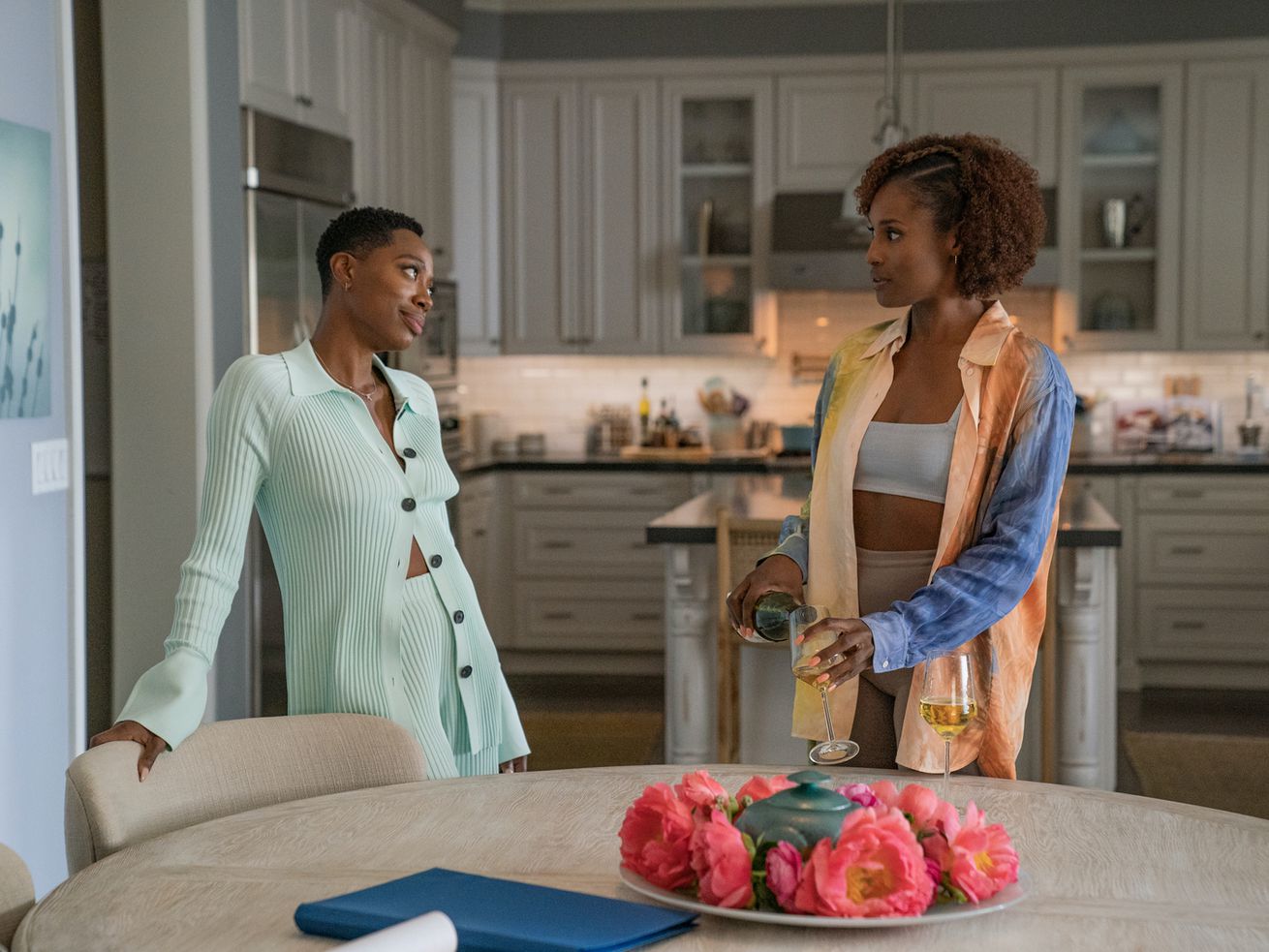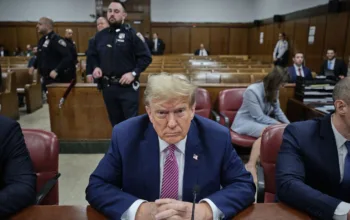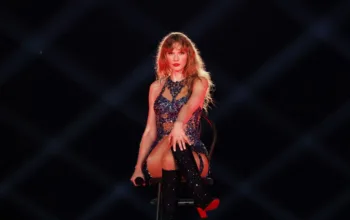Issa Rae’s HBO show might be ending, but the work she started has just begun.
Deviating from my usual TV habit of not watching a show until it’s in the third season or even been off the air for almost a decade, I came to Insecure right on time, when it premiered during my senior year at Howard University five years ago.
I experienced every moment with my peers — Issa Dee’s (Issa Rae) awkward rap monologues with herself in the mirror, her fiercely intimate friendship with Molly (Yvonne Orji), her achy-breaky “will they, won’t they” dance with her boyfriend Lawrence (Jay Ellis), and the backshot heard across the world at the end of season one. The communal watching experience was an integral part of the show, a dynamic the writers often played into, teased, and embraced.
Insecure has a solid place in TV history. Following Wanda Sykes’s 2003 premiere of Wanda at Large on Fox, Insecure — which was co-created by Larry Wilmore — is only the second show created by and starring a Black woman. The friendship at the center of it was significant, too. We so rarely get to see a show with two dark-skinned Black women leads, let alone two Black women who love each other deeply. While there have been other shows — Being Mary Jane, Girlfriends, Living Single — that captured elements of these experiences, the characters were so often fully formed, already excellent and unchanging. On Insecure, Issa, Molly, Tiffany (Amanda Seales), and Kelli (Natasha Rothwell) were becoming. They were something previously unseen: valuable, lovely, worthy Black works in progress.
Over these past few years, it’s been these simple acts of representation, combined with the humor and heart of Insecure, that has shaped its own community around the show, especially on social media during Sunday night live-tweeting sessions. “It felt real, almost too real, evidenced by the rabid debates it sparked weekly,” says Bassey Ikpi, author of I’m Telling the Truth, but I’m Lying. “It was simply about seeing us as we are. No judgments. No villains or heroes. Just Black folks trying to figure things out — sometimes failing in the process but always able to keep going.”
It wasn’t until I left Howard and moved to the suffocatingly white city of Denver (I feel Tiffany’s impending pain, I really do) a year after the premiere that I appreciated Insecure to the fullest extent. In the midst of one of the loneliest periods of my life, it was a portal to the world of Blackness I’d left behind, a world that I didn’t know would be so hard to return to after college, when jobs and moving would take me further from who I wanted to be.
Insecure was exactly what I needed, exactly when I needed it. As I moved through a white world for the first time in years, Insecure provided me with a glimmer of what I had been missing, where I could see everyone who’d ever loved me or hurt me or laughed with me represented onscreen, in all our beauty.
/cdn.vox-cdn.com/uploads/chorus_asset/file/23118342/yvonne_orji_issa_rae_natasha_rothwell_amanda_seales_wade_allain_marcus.jpg) HBO
HBOIt was a Black-ass show, and it felt real, like it was written for us. It actually spoke to Black people — an unfortunately rare quality in television — rather than creating ham-fisted and often dubious storylines that just feel like Instagram slideshows about microaggressions aimed at educating white people. At every level, Black creatives were given the reins — Black writers, musicians, costume designers, directors, hairstylists, and visual artists all came together to give Insecure its signature stylish, sexy, and unmistakably Black AF aesthetic.
For me, the end of Insecure feels strangely personal, in a way I haven’t felt with any other show. It sounds cheesy, but I’ve grown up with these characters. Every milestone and setback, and all the characters’ heartbreaks and triumphs and joys, are so similar to my own journey through my 20s. Saying goodbye to them feels like acknowledging that I’m entering a new phase in my life, a new phase of uncharted growth. Ashley Ray, an LA-based comedian and cultural writer who’s reviewed Insecure since it debuted, feels similarly. “I can’t help but feel like I’ve grown with the show and these characters,” Ray says. “Rae created a world so alive and personable I can almost chart moments in her characters’ lives to my own.”
Season five, our last with these characters, has seen each on a journey of growth and growing up. Molly is moving out of her history of romantic disasters, Lawrence is learning how to co-parent, Tiffany is moving to Denver, Kelli has gotten sober (champagne and weed don’t count), and Issa is focused on her career and what will truly make her happy. But through Kelli’s existential crisis, Molly’s mom’s stroke, and Lawrence’s airplane scare, this season is also about death and legacy. Who do we become when we leave this earth? What regrets might we have? What love do we leave behind? How are we remembered?
It’s possible that this focus on death and legacy is just another example of Rae’s gentle handle on the pulse of what Black millennials are thinking about amid a global pandemic and economic insecurity; she’s always been adept at exploring social issues without being overwrought and preachy. But it’s also possible that it could be a rumination on Issa Rae’s own living legacy, which has been creating opportunities for other Black creatives in the industry, like producer and writer Prentice Penny, director and producer Melina Matsoukas, and writer and producer Amy Aniobi. Rae, who’s also starred in movies like Little and The Lovebirds, has used her position to executive-produce A Black Lady Sketch Show, the Project Greenlight reboot, and HBO Max’s upcoming Rap Sh*t. She’s created her own audio company called Raedio — with the cooking show Butter + Brown and the podcast Fruit — and a production company called Hoorae Media.
Ashley Ray is now managed by 3 Arts, the production company behind Insecure, and she says it’s “something that probably wouldn’t have happened if Rae hadn’t ushered in a new era for Black artists.” And this new era looks bright, with shows like Harlem, Run the World, and Grand Crew that are centered on Black friendship. But even beyond that, Insecure has influenced a spate of programming like I May Destroy You that may not feel thematically similar, but is linked by one concept; Black people, especially Black women, having the freedom to be vulnerable and messy, without being exceptional or having their flaws sensationalized.
In an interview with the New York Times, Jay Ellis said, “That is part of the reason this show never felt like a burden. Because the burden is being excellent all the time. … But when we got to do the show the way Issa, Prentice, Melina and Amy wanted to do it, we didn’t have to wear a mask for anybody or live up to anybody else’s expectation. This is actual freedom.”
The end of Insecure does feel like a loss, a transition from one period of our lives to the next. I’ve grown up with Issa, and felt all her feelings of inadequacy and uncertainty, love and heartbreak, longing and irritation, joy and ambition. For so many of us, Issa and her friends were mirrors, reflecting our own journeys back to us. They depicted the imperfection of Black millennials, leaning into it, but always with grace. “Insecure wasn’t about highlighting our best or making our traumas into entertainment,” Ikpi says. “It changed how we saw Black-centered entertainment. It was okay for us to just exist without wondering what that existence looked like to folks outside of us.”
Last week, as I heard the news about feminist Black author bell hooks’s death, I came across this quote from her book remembered rapture: the writer at work. “No black woman writer in this culture can write ‘too much.’ Indeed, no woman writer can write ‘too much.’ … No woman has ever written enough,” hooks wrote. That’s how it feels to say goodbye to Insecure. I’m full of gratitude for this loving and creative portrayal of Black women, but I’m still unsatiated. Because we can never have enough of this, we can never have enough of seeing our stories. Insecure was a groundbreaking show because it left us hungry and demanding more, knowing that we deserve more.
Author: Nylah Burton
Read More



